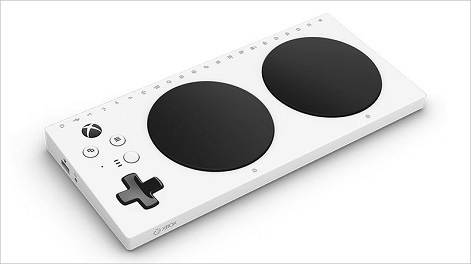Out of all the major hardware companies, it's been Microsoft that has been pushing to make games more accessible.
Then just ahead of this year's LA trade show, Microsoft unveiled the Adaptive Controller, a bit of kit designed to be used in any number of configurations. The hardware was made in collaboration with charities such as the UK's own SpecialEffect, with the end goal of allowing differently-abled consumers the chance to easily play games.
Speaking to PCGamesInsider.biz, gaming and disability community lead and Mixer program manager Tara Voelker says that this focus is the result of Microsoft's CEO Satya Nadella, who took the top job in 2014 and has apparently been encouraging such niche endeavours within the company.
"Nadella is very focused on this. Microsoft's mission is literally about empowering everyone on the planet to be better. Part of empowering everyone is accessibility," she explains.
"Nadella really drives this from the top down and for a long time there have been a lot of people at the bottom who cared about this and now have the support they need to actually make these changes. These have been in the works for a long time and we are now seeing the fruits of our labour."

Support from the top has been half of the reason this focus has come to the fore now. The other part of the puzzle is that the outward conversations necessary to produce such initiatives take a while - especially given that accessibility hasn't really been a priority for any of the big tech and hardware companies.
"There has been a lot of learning and growing that has had to happen," Voelker explains.
"If any company decides they wanted to learn about making an accessibility product, they have to invest, learn about it, get subject matter, experts and so on. That process only started a few years ago for the whole industry. It definitely does seem that it's taken forever for accessibility to become big, not just for Microsoft but for the entire industry. What we are seeing now is the result of a few years ago people realising that we have to pay attention. People just had zero knowledge and we've had to learn for ourselves versus other industries that already have research stocks and white papers. We didn't have any of that available to us. We had to get that knowledge before we could even take a step forward on making these kinds of products. That takes a long time."
If any company decides they wanted to learn about making an accessibility product, they have to invest, learn about it, get subject matter, experts and so on. That process only started a few years ago for the whole industry.
But there is still a lot of do before games are totally accessible to everyone. For one, Voelker says that some standards need to be introduced across the board.
"The games industry needs to step up and do two separate things. The first is that we need to standardise as an industry some basic accessibility features," she explains.
"Having remappable controls be a standard thing you accept in a video game. Having video game subtitles be big enough to read and in a sans serif font. There are some really basic things that not all games have that are easy wins that we need to get better at doing.
"Secondly, we need better representation of people with disabilities in video games. We've been seeing more representation lately but it's not always the best representation. You'll see a character in a wheelchair and my first reaction is excitement but then you look closer and think: 'That person would never actually use that type of wheelchair'. It's a step in the right direction but if they had just spoken to a wheelchair user, they would have been able to give them that feedback. We have to have an actual dialogue with people to make sure that when we do have representation it's the right representation."
For now, it's clear that Microsoft is going to be the one leading this charge for some time to come. That's not to undersell the hard work of other organisations and charities around the world who have been fighting this fight for a long time now. But this is the first time a major games company has put a line in the sand and said that this is an issue that matters in such a grand way.
"We're saying that all gamers are important and if the industry is going to keep saying it's about all gamers and wanting everyone to play their games," Voelker says.
"Your target audience is everyone, so you then you should mean it. Everyone includes gamers with disabilities who are actually more dedicated customers; they play your titles for more hours more frequently than their non-disabled counterparts and they're more likely to buy more of your products. It's not just: 'You should do it because it's the right thing to do, don't be a shitty person', but also because it's a really good financial business investment to make products for gamers with disabilities'."
She concludes: "If you're not going to be a good person, we have to tell you another reason, that you can make money doing it."

















